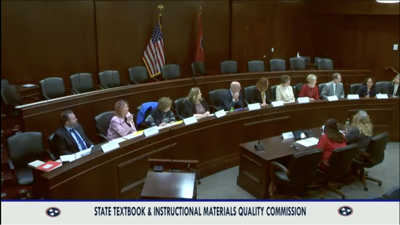The Textbook and Instructional Materials Quality Commission on Friday passed guidance on library materials. The new guidance brings the state in line with legislation passed in 2022 that requires the commission to provide guidelines for school districts about considering library materials for age appropriateness. The law also gives the body the power to remove books from libraries across the state through an appellate book-challenging process. The guidance was supposed to have been released by Dec. 1, but the commission wasn’t able to meet the deadline — in part because the commission requested that the state attorney general's office review the draft.
As of publication time, the guidance is not currently posted on the textbook commission’s section of the Tennessee Department of Education website. The Scene was directed by a TDOE representative to reach out to commission chair Linda Cash, who says, “The TDOE should have the document posted soon.” While the TDOE is required to assist the commission with certain aspects like providing training for members and hosting related information on its website, the two are separate entities and the law states: “The department's role in the textbook adoption process is strictly limited. The department shall not perform any duties as part of the textbook adoption process other than the duties specifically assigned to the department.” A department representative confirms that the two entities are separate. Which entity is responsible for certain responsibilities, however, is unclear.
Though the official guidance is not yet accessible, WPLN shared a draft version in February, and Cash stated Friday that “there was only one recommended change,” to that version of the guidance, and “it is minor” — an inconsequential wording change.
The guidance lays out processes that school districts should follow to review books and potential challenges to them — processes that many districts already have in place. It describes how book challenges could be carried out, but recognizes that the guidance is not “the exclusive means” for these kinds of processes. Staff, students and their parents or guardians can submit challenges, and the guidance provides timeframes and parameters on local review committees’ make-up. These local representatives must read the materials in their entirety and make recommendations to school boards on whether to remove books from “the library collection or grade level for which it has been deemed appropriate or inappropriate.” If the challenger disagrees with the local school board, they have five days to appeal that decision to the textbook commission.
Commission members do not have to read materials in their entirety. Instead, they can lean on review information provided by local districts to answer questions like, “Are the materials suitable for and consistent with the educational mission of the school?” and “Are the materials appropriate for the age and maturity levels of the students who may access the material?” The guidelines note that “determining factors” will include “mature themes or content (i.e., violence, sexual content, vulgar language, substance abuse).” The guidance also establishes that books that have already been voted on by the commission cannot be appealed to the body again for another three years, that eligible people cannot file more than two appeals per year and that each appeal can only consider one submission. It also states that books can remain in libraries while they’re being challenged.
In previous meetings, commission members have expressed the need for more support from the state. Because the board is volunteer-based with no staff and limited assistance from the TDOE, its members have little administrative support.
“We have an all-volunteer board, and suddenly they got tasked with much more than I think most of them were expecting,” Sen. Jon Lundberg (R-Bristol) told the Scene earlier this year. “So I think we've got to look at some staffing and some legal support for them.”
The commission should include 11 members appointed by the governor, lieutenant governor and speaker of the state House. Right now, one position is vacant and pending appointment. Katie Capshaw of the Tennessee Association of School Libraries was appointed to the commission in November by Lt. Governor Randy McNally.





